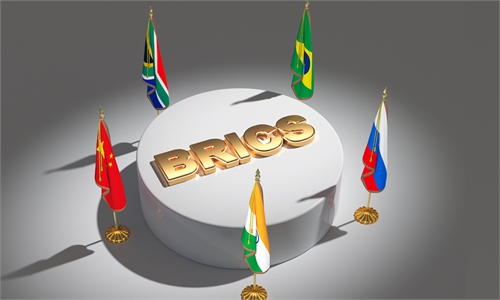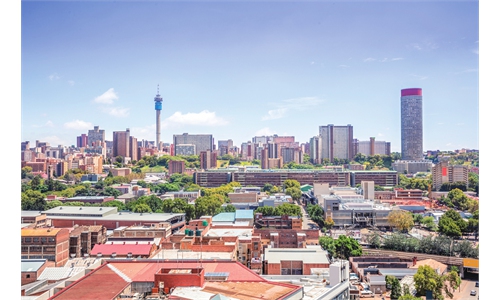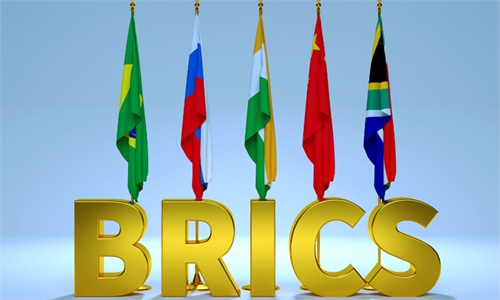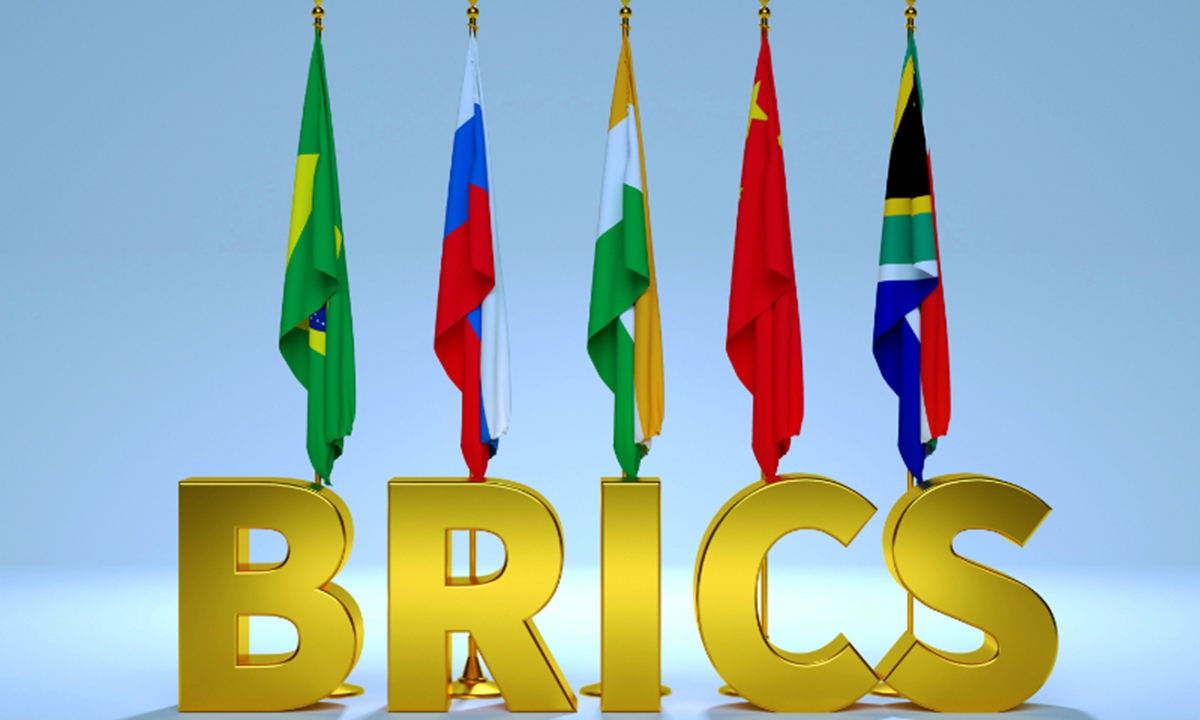
BRICS Photo:VCG
The first offline BRICS summit in over three years will be held in Johannesburg, South Africa next week, and Chinese President Xi Jinping will pay a state visit to the country and join other BRICS leaders to discuss issues on development of concern to emerging economies and developing countries and the international community.
The highly-anticipated summit will provide emerging markets and developing countries the opportunity to fully discuss challenges they face on boosting development in the post-pandemic era and will further strengthen South-South cooperation amid growing geopolitical risks, analysts said.
Xi will attend the 15th BRICS Summit in Johannesburg, South Africa and pay a state visit to South Africa from August 21 to 24, at the invitation of President of the Republic of South Africa Cyril Ramaphosa. While in South Africa, Xi will co-chair with President Ramaphosa the China-Africa Leaders' Dialogue, Chinese Foreign Ministry Spokesperson Hua Chunying announced on Friday.
This summit is the first offline BRICS summit held in over three years and marks the return of the BRICS summit to Africa after a five-year hiatus. It will seek to strengthen dialogue and cooperation between BRICS and Africa and other emerging markets and developing countries and send a strong message of safeguarding multilateralism and focusing on common development, Chinese Foreign Ministry Spokesperson Wang Wenbin said at the press conference on Friday when talking about expectations of the upcoming summit.
Wang said that the summit will carry forward the sound momentum of cooperation from the BRICS "China Year" 2022 and blueprint a brighter future for BRICS, adding that all sides will have in-depth exchange of views on prominent global challenges, enhance coordination and collaboration in international affairs, inject stability and positive energy into today's world fraught with uncertainties, and contribute wisdom and strength to world peace and development.
This year's BRICS chair South Africa has invited a total of 69 countries and regions to the summit. Russian President Vladimir Putin will join other BRICS leaders via video link, media reported.
In the post-pandemic era and amid a turbulent international security situation, this year's BRICS summit will highlight the urgent need of developing counties and emerging markets for development as well as their intention to strengthen independent cooperation and solidarity, Yang Baorong, director of the division of economy at the China-Africa Institute, told the Global Times on Friday.
Also, as the BRICS countries account for approximately 40 percent of the global population and about a quarter of the world's GDP, the summit will also show the world the majority of developing countries and emerging economies' attitude and approaches to some global concerns, and their appeals for the reform of global governance, which will also inject stability and positive energy into a complex world, said Yang.
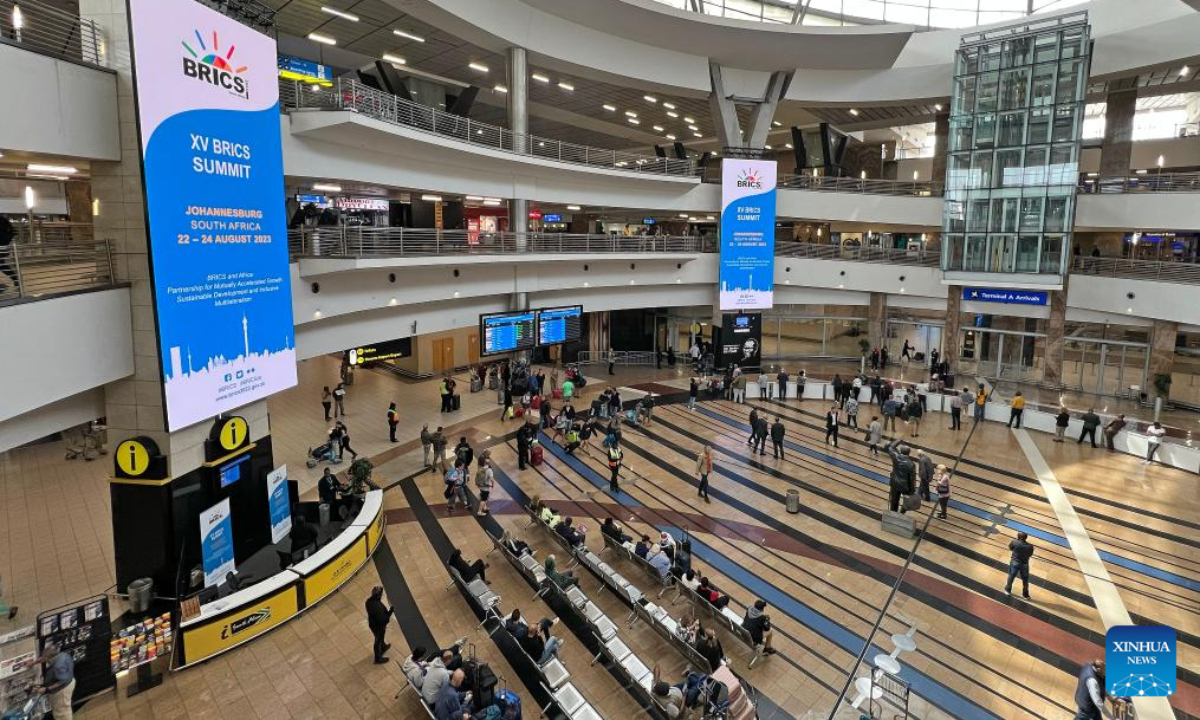
Electronic screens of the 15th BRICS summit are seen at the O.R. Tambo International Airport in Johannesburg, South Africa, Aug 16, 2023. The 15th BRICS summit is to be held in Johannesburg, South Africa, on Aug 22-24. Photo:Xinhua
Mechanism of cooperation
Topics on BRICS expansion will be high on the agenda of the upcoming summit, as BRICS states are implementing the political consensus they reached at last year's summit to give an active response to the concerns and needs of more emerging markets and developing countries, Zhu Tianxiang, director of the Institute of Foreign Relations of the BRICS Research Institute of Sichuan International Studies University, told the Global Times.
More focus will be put on discussing details on standards and procedures to include new members, analysts said, noting that countries that have expressed growing interest in joining BRICS have always played important roles in regional and international affairs and this is why BRICS expansion has attracted more attention in recent years.
South Africa said some 40 countries and regions have shown an interest in joining the bloc, including Saudi Arabia, Argentina and Egypt, media reported.
This year's summit will also include various topics of shared concerns of BRICS and developing countries, including promoting political security, boosting the usage of local currencies, and cooperation on digital economy, Zhu said.
How to strengthen financial cooperation, especially in the context of the global multilateral financial system, has been an issue of great focus since the beginning of BRICS cooperation as the upgrading of this cooperation itself took place after the 2008 global financial crisis. And for the past decade or so, BRICS countries have consistently prioritized promoting cooperation in the global multilateral financial field - this is why BRICS countries will pay more attention to the usage of local currencies, said analysts.
De-dollarization is not the mission of BRICS countries, some observers said in response to some Western media's hyping of such topics, and they noted that making the global financial system more inclusive and fairer and better represent the changes of the global governance system is truly what BRICS countries, other emerging economies and developing countries pursue.
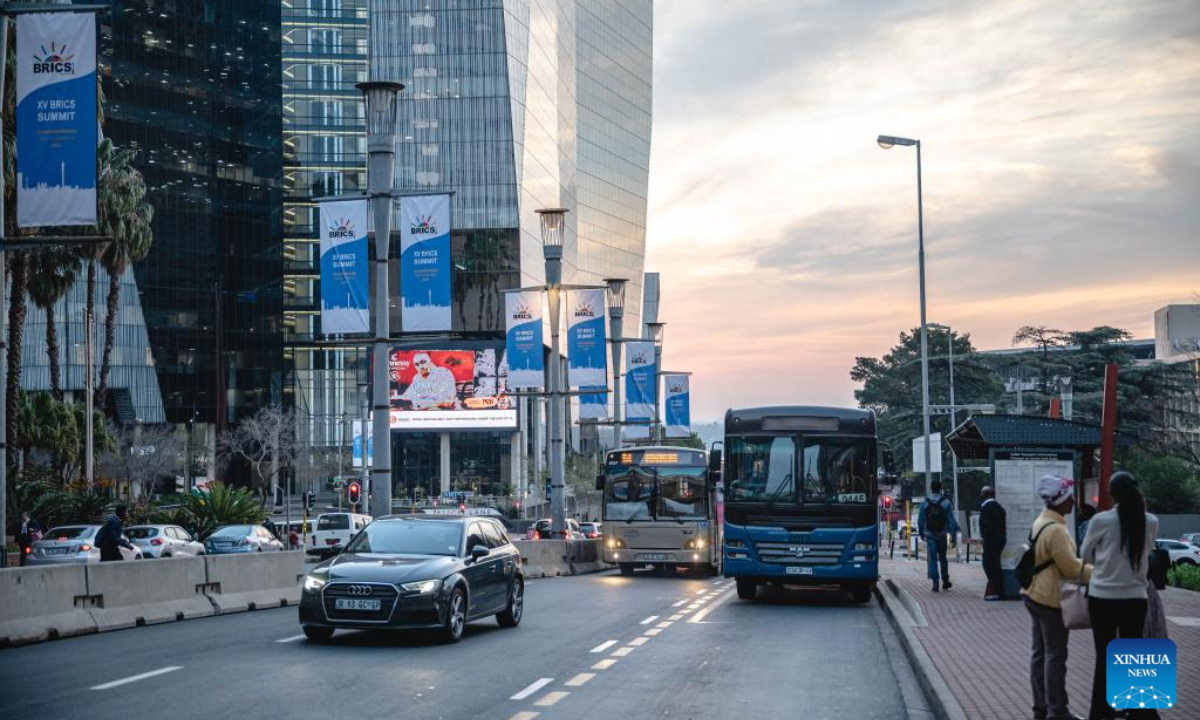
Signboards of the 15th BRICS summit are seen in a street of Johannesburg, South Africa, Aug 17, 2023. The 15th BRICS summit is to be held in Johannesburg, South Africa, on Aug 22-24. Photo:Xinhua
Shared need for development
The most emphasized aspect of this year's summit is South Africa's role as the chair and its unique identity as a representative of African countries, analysts said, noting that South Africa has set a series of key directions for hosting the summit, including on the partnership between BRICS and African countries, promoting high-speed growth, sustainable development, and inclusive multilateralism.
South Africa has reportedly invited the heads of state of all African countries to the summit to discuss how BRICS countries can partner with Africa to help the continent achieve economic growth.
Both South Africa and other African countries have high expectations of the BRICS mechanism as they have faced unprecedented challenges on development and have acknowledged how supportive and complementary South-South cooperation is, said Yang.
The BRICS countries - Brazil, Russia, India, China and South Africa - each have different industrial and development advantages, which could boost Africa's economic development and help with the continent's post-pandemic recovery, said the expert.
Moreover, President Xi's visit to South Africa - his first visit to the African continent since the 20th National Congress of the Communist Party of China (CPC) in 2022, is also expected to deepen China-South Africa and China-Africa cooperation, analysts said.
In 2013, President Xi visited Tanzania, South Africa and the Republic of Congo on his first overseas trip as Chinese President.
China and African countries are expected to expand cooperation on industrial and trade cooperation during the summit. Moreover, the BRICS summit also offers a platform for high-level exchanges of heads of state and senior officials from China and African countries on what topics should be addressed or prioritized in future China-Africa cooperation, said Yang.
The problems that many African countries have faced are also problems shared by many other developing countries and emerging markets. While many Western countries are mired in economic decline and deep-seated domestic problems, more developing countries are turning their eyes to the BRICS mechanism and South-South cooperation to seek better solutions, said Yang.
However, the purpose of strengthening South-South cooperation is not to exclude North-South cooperation, but rather to uphold the rights that BRICS countries, including the developing world, should rightfully have within the global governance system, said Zhu.
BRICS countries never aim to position themselves against developed countries, and it is usually Western experts and media who pit BRICS countries against Western countries and the G7, said Zhu.
The "power of BRICS" that member states want to highlight at this year's summit is solidarity, no confrontation, and what it hopes to promote is cooperation not clashes, said analysts.


